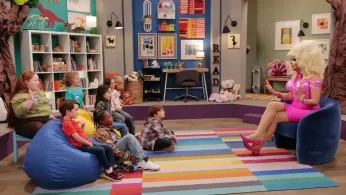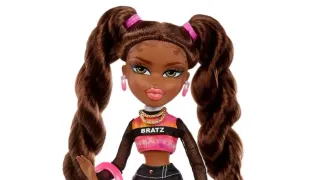
6 hours ago
Trixie Mattel Reads Eric Trump’s Book to Kids
READ TIME: 5 MIN.
RuPaul’s Drag Race alum and beloved drag performer Trixie Mattel made headlines this week by bringing back her much-loved “Drag Queen Storytime” segment on Jimmy Kimmel Live!. The featured reading was none other than Eric Trump’s recently published memoir, "Under Siege: My Family’s Fight to Save Our Nation". Framed as a playful attempt to “build a bridge and join hands through literature,” the segment quickly shifted into a comedic roast of the Trump family’s literary effort.
Dressed in full drag glam, Mattel greeted a group of children and immediately addressed the elephant in the room: “Do I scare any of you?” The children’s enthusiastic response—“You just look amazing. Why would that be scary?”—served as an early, affirming rebuttal to ongoing conservative backlash against drag performers reading to kids and participating in public events.
The segment’s structure mirrored the traditional “Drag Queen Story Hour” format, which has become a flashpoint in national debates about LGBTQ+ visibility and the rights of performers in public spaces. With characteristic camp and wit, Mattel invited the children to select a book together, joking, “What if we chose one together? Because this is, after all, a democracy. As of this morning, it’s still a democracy, I’m not sure”.
When the stack of books included titles by Donald Trump and Ted Cruz, the children’s collective groan signaled both the comedic tone and the political resonance of the segment. Mattel’s reading of Eric Trump’s memoir was punctuated by playful banter and sharp asides. At one point, after reading an excerpt praising Donald Trump’s “heart of gold,” a child interrupted: “OK, I’mma stop you right there. Instead of skipping this page, we should skip the entire book.” Another child asked bluntly if they could go straight to lunch.
Mattel’s quips—such as “Eric isn’t potty trained”—elicited laughter from both the children and the studio audience, highlighting the segment’s blend of satire and childlike honesty.
Mattel’s appearance and the format of the sketch drew attention to ongoing legislative and cultural battles over drag performers’ rights and LGBTQ+ inclusion in public life. Over the past several years, events like “Drag Queen Story Hour” have faced attempts at restriction or outright bans in some states and municipalities, fueled by claims of inappropriateness or controversy.
By bringing children and drag performers together on national television, the segment offered a visible counterpoint to these narratives, showing kids engaging joyfully and respectfully with a drag queen. The children’s reactions—unfazed and affirming—stood in contrast to the heated rhetoric often deployed by opponents of LGBTQ+ events in public spaces.
The segment culminated in a playful “science experiment,” as Mattel and the children fed Eric Trump’s memoir into a wood chipper, declaring, “This might not be a great book, but it’s going to make excellent confetti.” The moment was met with cheers from the young audience and laughter from viewers, reinforcing the segment’s tone of light-hearted resistance.
This act of literal shredding served as both a comedic punchline and a symbolic critique of the book’s content and its place in contemporary political discourse. By turning a political memoir into confetti, Mattel underscored the power of humor and performance in challenging divisive narratives.
By ending the segment with the line, “See? Reading isn’t scary. It’s just the people who write the books sometimes,” Mattel encapsulated the spirit of the event: a celebration of diversity, humor, and resistance rooted in community and solidarity.
The revival of “Drag Queen Storytime” on Jimmy Kimmel Live! signals not only the enduring popularity of drag performers in mainstream media, but also the ongoing importance of queer visibility and advocacy. Through laughter, satire, and affirming representation, Trixie Mattel and the children who joined her created a moment of joyful resistance—a reminder that inclusion, creativity, and humor remain powerful tools in the face of political and cultural division.






